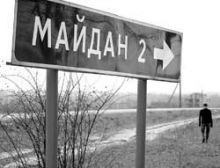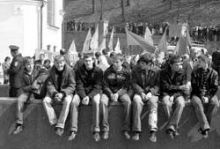What did organizers of the National Unity Forum, on the one hand, and the Down with zRada! campaign, on the other, try to achieve and what did they in fact achieve by bringing thousands of people onto the streets of Kyiv? Some leading Ukrainian political scientists, whom The Day requested to analyze the advantages and disadvantages of these actions, agree in one thing: unfortunately, although both Orange and Blue-White voters showed strength, they fell victim to shrewd political spin masters. In other words, the people were duped again.
Maksym STRYKHA, scholarly programs manager, Institute of Open Policies”
“In my opinion, the plus side of the European Square rally was that its organizers relied on the administrative bodies of all levels and knew very well what and how to do.
“The downside of this rally is, in my view, its artificial nature, lack of genuine militants and genuine support of the people. For I do not doubt that the rally could have gathered under its banner a lot of volunteers from, say, Donetsk, But, in Kyiv, we saw people who were doing their bit for a reward and, incidentally, did not even ty to hide this fact.
“The situation was radically different on Independence Square. The rally consisted of the people who came to show their political stand. Most of these people came at their own wish.
“Now the downsides. By contrast with their opponents, who brought people onto European Square with the sole purpose of staving off the dissolution of parliament, the organizers of the Independence Square rally nurtured rather different plans. For example, while Yulia Tymoshenko was, naturally, bent on snap elections, other protesters were not absolutely sure that early elections were really necessary, although they shared Tymoshenko’s rhetoric. The point is they clearly see that in case of a snap election Ukraine may end up split in two parts.
“The fact that Viktor Yushchenko visited neither of the rallies, although both of them expected him to appear, inspired a hope in me that the president will be acting as guarantor of the Constitution and the nation’s supreme arbiter, rather than a hostage to a certain political force.”
Volodymyr FESENKO, the head of the managing committee of the Penta Center of Applied Political Research:
“I think, the fact that the coalition’s Maidan is over is its main advantage. It seems to me that it was a surprise for opposition, and, probably, for the president as well. In my opinion, the coalition actually wanted to demonstrate that it is, too, able of gathering people in Kyiv. Let them be non-residents of Kyiv, the main thing was to show that they are able of applying the so-called ‘Maidan’ technology as well.
Another advantage of the pro-coalition Maidan is that they have not finished this ‘Maidan,’ but transformed it to some half-conserved form, in particular, they have applied the tactics used last summer (when the president was thinking on whether to submit Yanukovych a candidate for the premier’s post or to dissolve the Rada, — the author.) The main disadvantage of the pro-coalition Maidan is above all that this Maidan, contrary to the opposition’s one is to a larger extent artificial. This is the main disadvantage of this Maidan.
I would name the presence of large number of people, which was a surprise both for experts and for the organizers of the measure, an indisputable plus of the opposition Maidan. This is, probably, the main achievement. It appears to me that this Maidan has already become a powerful instrument of political and psychological pressure on the president. And probably this was the Saturday opposition’s meeting on the Maidan Nezalezhnosti that gave more argument for Yushchenko for signing an edict on the parliament’s dissolution.
The major minus of the opposition Maidan is that it took place to a large extent at account of people who were brought to Kyiv. It seems to me that the fact that the president has not visited none of the Maidans was a right decision. For the president above all has to be the nation’s arbiter, he cannot take part in the actions with a vivid political biasness. And the fact that the prime minister has come to the coalition’s meeting is an absolutely different thing. For the prime minister is not the nation’s arbiter. And the presidential institute is a non-party one. And here lies a fundamental difference. And since the thing is the Rada’s dissolution, the prime minister, as the coalition’s leader, defends the Verkhovna Rada from the preliminary ceasing of its plenary powers. And now it is a matter of principle for Yushchenko to be above this political struggle’s combat.”








